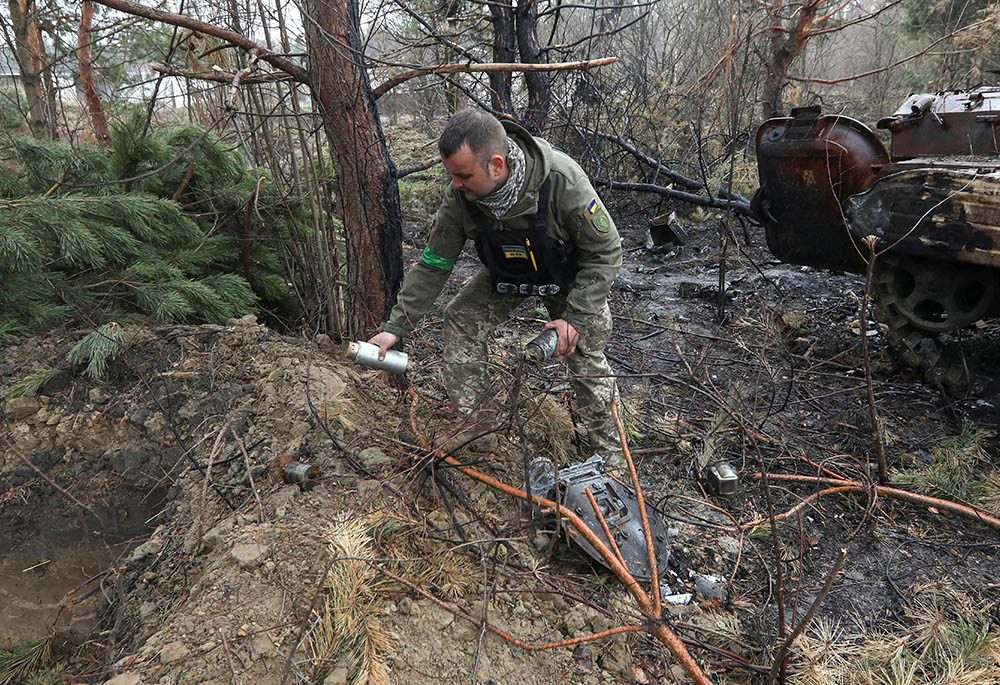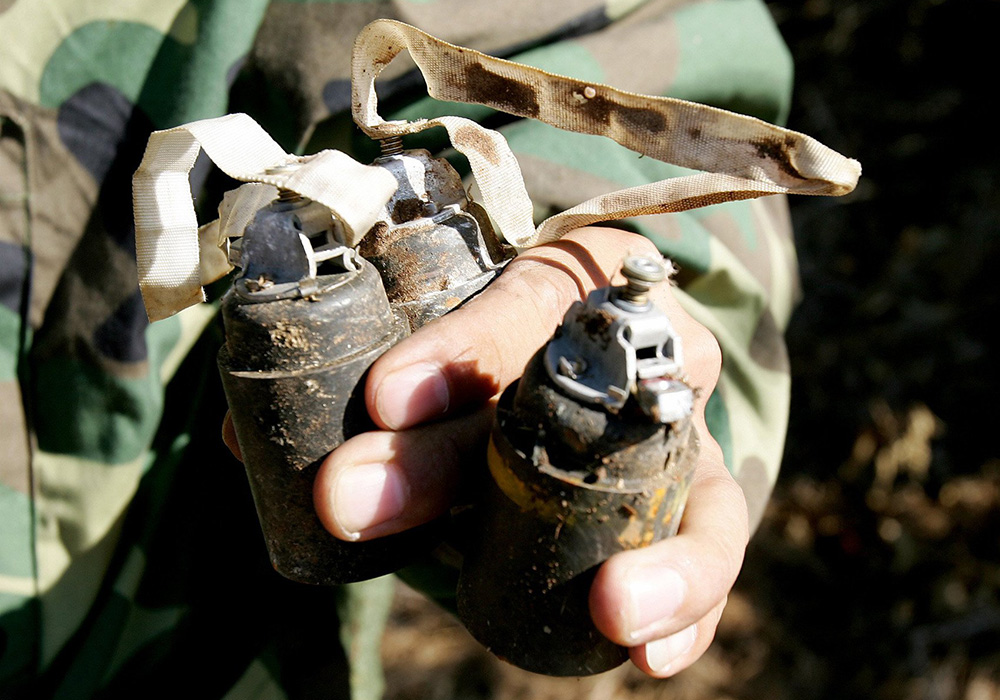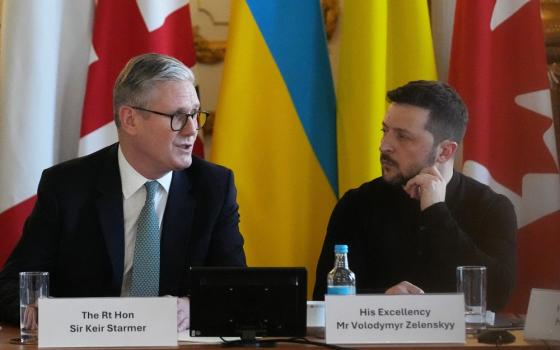
A Ukrainian soldier picks up unexploded parts of a cluster bomb left after Russia's invasion near the village of Motyzhyn, Ukraine, April 10, 2022. (OSV News/Reuters/Mykola Tymchenko)
Ukraine's war with Russia, unlike so many other conflicts of recent decades, has stood up to justifications thick with moral content. U.S. involvement, likewise, was not a delusional rush into military retribution or some imagined need to save the world from weapons of mass destruction. This was, and remains, about defense of sovereignty, preservation of democracy, and standing up against a bloody authoritarian's bald ambition.
Then the U.S. president decided to send cluster bombs. In order to do so, he had to override federal law that prohibited transfer of such weapons to another country.
The decision begins to erode the moral high ground for U.S. involvement in the conflict; the United Nations has already issued stinging condemnations of Russia for using similar weapons.
It also sets up an unsettling conscience question for U.S. Catholics, particularly those in the military involved in handling cluster munitions and carrying out their transfer to another country.
A clear record already exists of church opposition to the use of such weapons. In 2007, Bishop Thomas Wenski, then of Orlando, Florida, and currently archbishop of Miami, wrote to members of Congress in the name of the country's Catholic bishops urging passage of a law restricting use of cluster munitions.
"The Catholic Bishops of our country have been vocal supporters of efforts to reduce and ultimately ban the use of landmines, and the indiscriminate nature of failed cluster bomb 'duds' — which makes them akin to landmines — is deeply troubling to the conference," Wenski said at the time.
He noted the significance in Catholic moral teaching of protecting noncombatants. "The conference fears," he wrote, "that cluster munitions, if unchecked, could become the next generation of landmines."

A member of a U.N. mine-clearing unit carries unexploded bomblets from cluster bombs in this Sept. 5, 2006, file photo. These cluster bombs were dropped in Lebanon by Israeli forces during their conflict with Hezbollah in the summer of 2006. (CNS/Reuters/Peter Andrews)
His letter also quoted a 2006 statement by the Holy See: "The disastrous humanitarian impact of cluster bombs needs no further demonstration. ... Their victims can be counted by the million, the regions affected continue to be prohibited to displaced persons for years after the end of wars, nor can they be used by the inhabitants."
The Vatican was a signatory to the U.N. convention banning cluster munitions that was adopted in 2008 and went into effect two years later. Nearly 125 countries signed on to the convention. The United States did not. Nor did China, Russia or Ukraine.
President Joseph Biden, in a remarkably short time, has turned much of the world from head-shaking wonder at the nonsensical foreign policy of Donald Trump to belief again in a trusted and rational partner.
Global reaction opposing his decision to send cluster bombs, however, as well as objections from notable members of his own party, some with previous military experience, reveal a world uneasy with "whatever it takes" tactics.
As justifiable as the casus belli might be in Russia's invasion of Ukraine, it remains a fact that the means of modern warfare dwarf anything imaginable to those in earlier Christian eras who developed the just war theory. Certainly, today's weaponry quickly presses to the limits the conditions of proportionality and the need to discriminate between combatants and noncombatants central to the moral calculations of just war. Cluster munitions fit none of the categories in the just war calculus.
The weapons are tactically effective because, unlike conventional bombs that require far more precise targeting, cluster bombs are spread over vast areas. Those that don't explode remain deadly for decades. In too many places on the globe, women and children especially become victims of the "duds" post-conflict.
Both sides in the war in Ukraine are already accused of using them.
Advertisement
"Cluster munitions used by Russia and Ukraine are killing civilians now and will continue to do so for many years," Mary Wareham, acting arms director at Human Rights Watch, said recently. "Both sides should immediately stop using them and not try to get more of these indiscriminate weapons."
Thirty-eight organizations, including Catholic peace group Pax Christi USA, voiced similar objections in a June letter to Biden. "Cluster munitions are among the most harmful weapons to civilians, as they are designed to disperse indiscriminately and often fail to explode on initial use, littering communities with unstable unexploded ordnance and causing devastating harm to civilians, and especially children, years after a conflict ends," they said.
San Diego Cardinal Robert McElroy, in a widely noted talk last March at the University of Notre Dame, spoke of a need to update an "atrophying" just war theory, yet described the situation in Ukraine as one of those extreme moments when armed intervention is necessary. He termed the moral justification for defending Ukraine "unassailable."
At the same time, he noted, "the overarching strategic framework of the just-war tradition ... has become hobbled in its ability to provide effective comprehensive guidance in the modern day."
However the just war theory may or may not apply, it is reasonable for Catholics to expect guidance from their leaders when the state decides to deploy weapons the church has condemned. So, it is notable that in the discussion leading up to Biden's decision and in its immediate aftermath, there was silence from the U.S. bishops' conference and silence from the U.S. Archdiocese for the Military Services. Neither organization provided a response when asked for reaction to the Biden decision.
Questions hang in the air, unanswered. We are left to conclude that silence, in this case, gives consent.
We are further left to wonder how far down the path our religious leaders are willing to go in this war-plagued world in accommodating military logic that we know deeply offends and contradicts our Gospel and teaching tradition.






